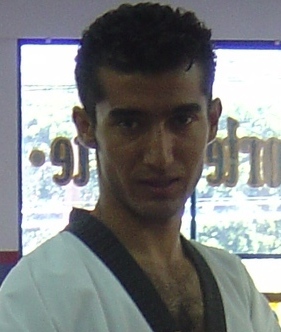1. Early Life and Taekwondo Beginnings
Guillermo Pérez's journey into taekwondo began at a very young age, influenced by popular culture and quickly progressing through state and national competitions, establishing him as a promising talent in the sport.
1.1. Childhood and Education
Guillermo Pérez Sandoval was born on October 14, 1979, in Taretan, Michoacán, Mexico. His interest in taekwondo was sparked when he was just five years old, heavily inspired by the action films of legendary martial artist Bruce Lee. This early fascination laid the foundation for his future career in the sport.
1.2. Early Training and Competitions
Pérez began his taekwondo training at the age of five. By the time he was ten, he had already claimed his first victory in a state tournament held in Michoacán. This early success opened doors for him to compete at the national level, where he earned a bronze medal in his initial national competition. In 1989, he achieved first place at the national infant competition. His talent soon took him beyond national borders; in 1995, he traveled to Ottawa, Canada, for his first international competition, where he secured a second-place finish. The following year, in 1996, he won first place at the Taekwondo U.S. Open, a prestigious event that featured competitors from over 60 countries.
2. Career
Guillermo Pérez's professional taekwondo career was characterized by dedicated training, consistent participation in major international events, and ultimately, an Olympic gold medal that cemented his place in Mexican sports history.
2.1. Mexico National Team
In 1999, Pérez relocated to Puebla to train under William de Jesús, an acclaimed Olympic champion. This move proved pivotal for the 20-year-old Pérez, providing him with the experience and refinement needed to finally gain entry into the Mexican national taekwondo team after previous unsuccessful attempts. As a member of the national squad, he participated in the 1999 Pan American Games held in Winnipeg, Manitoba, Canada.
Pérez continued to compete at the highest levels, placing ninth at the 2005 World Taekwondo Championships in Madrid, Spain, in April 2005. Three years later, he achieved a second-place finish at the Dutch Open, an accomplishment that qualified him for the 2007 World Taekwondo Championships in Beijing. Competing in the flyweight (128 lb (58 kg)) category, Pérez earned a silver medal, losing to Juan Antonio Ramos of Spain in the final match.
2.2. 2008 Beijing Olympics Gold Medal

On August 20, 2008, Guillermo Pérez achieved the pinnacle of his career by winning the gold medal at the 2008 Summer Olympics in Beijing, China. Competing in the -128 lb (58 kg) category, Pérez faced Gabriel Mercedes of the Dominican Republic in the final match. The intense contest concluded with a 1-1 tie after four rounds of action. However, the judges unanimously decided in favor of Pérez, awarding him the gold medal.
This victory held immense historical significance for Mexico. It marked only the third gold medal for the country since the 2000 Summer Olympics in Sydney, Australia, and was particularly notable as the first Olympic gold for a Mexican male athlete since the 1984 Summer Olympics in Los Angeles, United States. Overall, Pérez's gold medal was the 11th Olympic gold medal in Mexico's history and the country's 53rd overall Olympic medal across all sports.
3. Legacy and Influence
Guillermo Pérez Sandoval's Olympic gold medal profoundly impacted taekwondo in Mexico and established him as an enduring figure in the nation's sports history. His victory in Beijing garnered significant national attention, serving as a powerful source of inspiration for aspiring young athletes across Mexico. By breaking a long-standing drought for male Olympic gold medalists, Pérez demonstrated that with dedication and perseverance, Mexican athletes could achieve top honors on the global stage. His success not only elevated the profile of taekwondo within Mexico but also became a symbol of national pride and athletic achievement, reinforcing the sport's importance in the country's sporting culture.